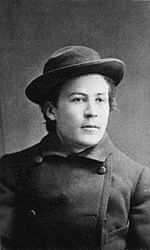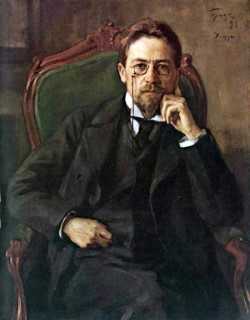Jack Coulehan
Stony Brook, New York, USA

medical student
October 1883. A fifth-year medical student at Moscow State University agonizes over his upcoming exam. “Woe is me!” he writes to his older brother, “I am forced to learn almost everything from the beginning… cadavers to be worked on, clinical studies, making the rounds of the hospital. I work and feel my incapacity. My memory has become poor as far as cramming is concerned, I have aged…”1 This is nothing new. In earlier letters he complained about memorization, cramming, difficult professors, and frequent exams. “I am extremely tired, ill-tempered, and sick.”
Any medical student today can easily appreciate young Anton Chekhov’s predicament, although perhaps in some ways he had less to complain about than his contemporary American counterpart. For one thing, he had a full five-year scholarship, including living expenses, rather than bearing the burden of six-figure student loans. Second, one might argue that Chekhov had far less material to learn. The discoveries of Koch and Pasteur had just barely penetrated Russia. Mare’s milk was still a popular treatment for tuberculosis. And no one had ever heard of a hormone. Finally, Chekhov had the advantage of a large, close-knit family that lived nearby. Mom’s home cooking was just around the corner.
Nonetheless, Anton suffered the standard medical student mixture of embarrassment and bravado. He grumbled about friends and relatives who needled him for medical advice, “I have the misfortune of being a medical student and everyone thinks they can come along and have a little chat about medicine.”2 At the same time he pretended to be an expert when cautioning his older brother and his wife about how to feed their infant daughter.3
Chekhov was neither an academic star, nor a social standout. There were, however, two areas in which he excelled. The first was his ability to listen to patients and reconstruct their narratives. Dr. Pavel Archangelsky, Chekhov’s preceptor during summer externships at a rural clinic, reported that he “did everything with attention and a manifest love of what he was doing, especially towards patients who passed through his hands. He listened quietly to them, never raising his voice however tired he was and even if the patient was talking about things quite irrelevant to the illness. The mental state of the patient interested him particularly. As well as traditional medicines, he attached great significance to the effect the doctor had on the psyche of the patient, and on his way of life.”4
Chekhov put great emphasis on what today we would call the social history and clearly practiced narrative medicine long before “narrative medicine” was invented. Likewise, his interest in the doctor’s effect “on the psyche of the patient” reflected today’s fashionable notion of reflective practice. Later in life, one of Chekhov’s classmates recalled, “It was where one had to touch on the ordinary life of the patient, uncovering its intimate details, about how the illness developed into its present state that Chekhov seemed to bowl along effortlessly without forcing himself, in contrast to many students and even doctors who find it difficult to relate to the vivid statements emerging from the unique circumstances of patients’ lives.”5
The second field in which young Chekhov excelled was preventive medicine and public health. Dr. Eric Erismann, one of the first Russians to study the influence of social conditions on health, was his favorite professor. Under Dr. Erismann’s spell, he began an ambitious survey of “women’s diseases” in Russia, but – not unusual for a student project – he never had the time to complete it. But he took his professor’s message to heart. Some months after graduation, he commented to a friend, “The more experienced a doctor, the better he knows the power of hygiene and the relative weakness of treatment.”6 Later in his career, Chekhov would devote huge amounts of time and energy to public health activities, including several years of service as an unpaid zemstvo doctor. (A zemstvo combined the functions of rural free clinic and health department, along with providing other services.)

20’s or early 30’s
However, despite his scholarship, Chekhov did incur a self-imposed financial burden during medical school. After going bankrupt in their southern Russian hometown, his father had taken the family to Moscow to escape his creditors. By the time Chekhov entered university, his father was barely eking out a living as a clerk in a warehouse. The family lived in a dismal basement apartment. Two older brothers had gone out on their own, but neither had a reliable income. Anton was determined to become his family’s principal wage earner.
But how? Fortunately, he had an ace up his sleeve. He soon discovered that the humorous sketches and stories he loved to write were eminently salable. Using a number of pseudonyms, the first-year medical student began to peddle his handiwork to local newspapers and magazines. Although these venues paid only a pittance, over the next few years he published hundreds of pieces and earned enough to move his family into a better apartment and a more congenial lifestyle.
Where did the moonlighting medical student find his material? At least partly from his experiences with faculty and fellow students. Taken together, these early stories present a rather dismal picture of the medical profession. For example, in “Intrigues” (1883), Chekhov takes a comic view of an arrogant physician, who must have been similar to some of the professors he encountered in the hospital. Dr. Shelestov is vain and pompous, a big bag of gas, supremely sure of himself, a man whose professional opinion is worth its weight in… well, in floating kidneys! In “Village Doctors” (1882), written when he was a third-year student, Chekhov makes fun of lazy physicians. Because the doctor has taken the day off, two physician assistants are forced to staff the hospital clinic, with hilarious results. The young Doctor Chekhov continued, at least in the early years, to create physician characters who lack human sensitivity (“Darkness,” 1887) and/or behave unprofessionally (“Enemies,” 1885; “An Awkward Business,” 1888). Though Chekhov had several fine role models, he must have decided that good doctors do not make for very interesting stories.
Chekhov’s fictional medical students are, if anything, even less admirable characters. In “Anyuta” (1886) a student is cramming gross anatomy while Anyuta, his live-in concubine, sits across the room, shivering in their cold flat. Suddenly the student, in his attempt to master the chest wall, demands that Anyuta remove her blouse so he can identify its external landmarks. She complies. Later, despite the cold, he sends her to pose nude for an artist friend. She complies. Finally, the student tells Anyuta to pack up and move out. He is tired of her. No warmth or compassion here. In a later story, “A Nervous Breakdown” (1889), three young men cruise the capital’s red-light district. Two of them, a medical student and an artist, are frequent visitors. For the third, a law student, this is his first time. The sexual exploitation, cynicism, and social injustice overwhelm him and cause a nervous breakdown. He cries, “My God, my God, those women are alive!” But the medical student, insensitive to the prostitutes’ plight, responds dismissively, “One must take an objective view of things.”
When Chekhov graduated on June 16, 1884, he rented a small house in a middle-class section of Moscow for himself and his family. He hung out his shingle and soon had a growing general practice. Initially, he must have been euphoric. “I was so astounded at the success of my new career that I gathered up all my rubles and sent them off to Bannikov’s Inn and got in exchange vodka, beer, and such like medicines for my table.”7 Nearly two years later, in a letter to one of his editors, he described a busy day in the office, “I’m seeing a lot of patients, children with rickets and old folk with rashes. There’s one old lady with erysipelas on her arm. I’m afraid that it will extend to cellulitis of the deeper tissues. There may be abscesses, but I’m loathe to use the scalpel on her.”8
Although busy, Chekhov’s general practice was not profitable. Many of his patients were poor and could not pay. Others were friends or acquaintances whom he did not want to charge. Like most doctors of his era, Chekhov spent a good part of each day making house calls, which sometimes resulted in zero net income, as was the case with a prescribing error incident related by biographer John Coope, “There were moments of panic. One day he… remembered he had made a mistake with the dose on the prescription, putting the decimal point in the wrong place. With the last money in his pocket he hired a carriage and set off in pursuit of the patient, recovering the prescription before it had been dispensed.”9
Like his English contemporary Arthur Conan Doyle, Chekhov was forced increasingly to rely on writing to make ends meet. By 1890 he had given up the idea of a paying practice. Instead, he relied on literary income but continued seeing patients without charge and pursuing public health projects. Chekhov’s apprenticeship in writing while a student contributed more to his livelihood than his medical studies, but not to his personal identity, which remained that of a physician. Despite the famous quip that medicine was his lawful wife and literature his mistress, there is no question that it was the mistress who paid Chekhov’s bills.
References
- Yarmolinsky A. (Ed.) Letter to Alexander Chekhov. 15 October 1883. Letters of Anton Chekhov. New York, Viking Press, 1973, p. 13.
- Karlinsky S. (Ed.) Letter to N. Leykin. 21 August 1883. Letters of Anton Chekhov. New York, Harper & Row, 1973, p. 41.
- Coope J. Letter to Alexander Chekhov, 13 May 1883. Doctor Chekhov. A Study in Literature and Medicine. Chale, Isle of Wight, Cross Publishing, 1997, p. 25.
- Coope, p. 27.
- Coope, p. 21.
- Letter to Suvorin, 15 October 1884, p. 22.
- Letter to N. Leykin, 23 July 1884, p. 27.
- Letter to N. Leykin, 27 May 1886, p. 30.
- Coope, p. 30.
JACK COULEHAN is an Emeritus Professor of Medicine and Preventive Medicine and former director of the Center for Medical Humanities, Compassionate Care, and Bioethics at Stony Brook University. His latest collection of poetry, The Wound Dresser (2016), was chosen by Robert Pinsky, former poet laureate of the United States, as a finalist for the Dorset Poetry Prize. In 2012 he received the Nicholas Davies Scholar Award of the American College of Physicians for “outstanding lifetime contributions to the humanities in medicine.”
Highlighted in Frontispiece Volume 10, Issue 2 – Spring 2018

Leave a Reply